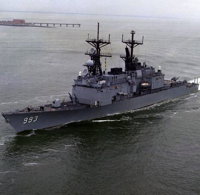Last week, in the Gulf of Oman, the Arleigh Burke-class missile destroyer USS Kidd seized an Iranian fishing dhow that had been hijacked and used as a mother ship by Somali pirates. In the course of the seizure, 13 Iranian hostages were freed, and 15 Somali pirates were taken into U.S. custody. The Iranian crew has now returned home after more than a month in captivity.
In and of itself, the rescue was not extraordinary. Other vessels participating in the U.S.-led multilateral naval task force fighting Somalian piracy in the region -- known as CTF-151 -- carry out such rescues regularly, even if deep doubts about the ability of the naval mission to end piracy persist. The current state of U.S.-Iranian relations, however, makes the rescue more interesting. Tehran has recently made loud noises about restricting freedom of the seas in the Persian Gulf and the Straits of Hormuz, going so for as to warn the U.S. aircraft carrier USS John C. Stennis not to return to the Gulf after its recent departure.
In this context, the rescue of the Iranian vessel represented a vindication of the U.S. Navy’s operant guiding doctrine, the Cooperative Strategy for Seapower in the 21st Century, from both a national and an international perspective.

